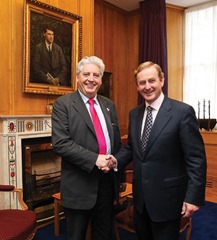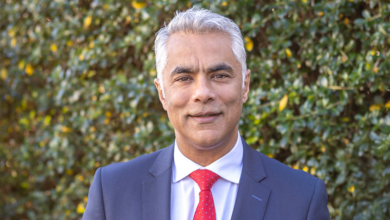Alasdair McDonnell interview: SDLP looking ‘upward’
 SDLP leader Alasdair McDonnell talks to Peter Cheney about his hopes for the party’s recovery and the need for a new ‘prosperity process’ to underpin stability.
SDLP leader Alasdair McDonnell talks to Peter Cheney about his hopes for the party’s recovery and the need for a new ‘prosperity process’ to underpin stability.
Alasdair McDonnell is often viewed as a confrontational leader but two years into his post, he has a quiet confidence about the SDLP’s prospects.
The state of the party is “upward,” McDonnell contends. After the party’s vote “slipped” at the 2011 Assembly election he had felt that it was time to run again as leader: “I basically felt that I was one of the few people able to work at some of the organisational stuff that was badly needed.” He now sees new members coming forward, new branches being formed and older ones “coming back to life.”
“A lot of this is very small,” he notes. “I spend a lot of my time sometimes sitting with three or four people around a kitchen table in Fermanagh or Tyrone. And it’s slow but it happens. People commit again and people feel there’s something happening.” Donors are also more likely to support the party now compared to this time two years ago.
Coming up to the local government elections, McDonnell is pleased to see a “surge” of young people and female candidates: “My aim, quite frankly, when I was elected was to ensure that we had a robust, fresh-faced young team going into the local government elections and we have that now.” The SDLP plans to field around 130 candidates.
Pressed on how he would define success, he points out that the party currently has 88 seats and the pro rata equivalent in the new councils would be 69. “Seventy upwards is positive,” he adds. “A seat won in an area where we don’t have a seat is just as important as an extra seat won in an area where we do have seats.”
Alex Attwood is the party’s European candidate but the electoral numbers, it is put to him, are totally against a second nationalist MEP. McDonnell dissents: “It depends on what numbers you take.” Last time round, Alban Maginness secured 78,489 first preferences and his final tally was 97,428. With another 18,000-19,000 votes, he would have overtaken Diane Dodds.
“It’s quite simply down to the question of mobilising our vote,” McDonnell emphasises. The council elections – essentially 120 local polls at once in the district electoral areas – will have a “multiplier effect” on turnout and every council candidate will effectively be a sub-agent for Attwood’s campaign.
Reconciliation
McDonnell sets out three priorities for the party: reconciliation, social justice and a ‘prosperity process’. Reconciliation comes first but is not limited to the two main communities in Northern Ireland. It also encompasses North/South co-operation and the relationship between Ireland and Britain.
“The nationalist and the unionist communities in Northern Ireland are very interdependent,” he notes. “If one goes up, they both go up. If one goes down, they both go down.”
The same logic applies in the all-island economy, with the North standing to benefit from a southern recovery, and across the Irish Sea. McDonnell is alluding to the 580,000 residents of Great Britain with Irish ethnicity and the strong networks of professionals within that population.
He comments: “Our economy and our future is so interlocked – culturally and in every other way – with Britain that we’ve got to do everything in our power to ensure that barriers to communication [and] barriers to working together across the two islands are removed.”
The SDLP has apologised for supporting the naming of a Newry play park after IRA member Raymond McCreesh. However, the party stands by its support for the release of Gerry McGeough, who was imprisoned for the attempted murder of a DUP councillor. The party’s handling of the case, it is put to him, damaged reconciliation.
“We accept his conviction,” McDonnell responds. “We feel very strongly that the same rules should apply right across the board.” McGeough, in his view, was made the “exceptional case” because he had fallen out with Sinn Féin and there was a suggestion that McGeough should have received more punishment than other former IRA members. The crime was “absolutely anathema” to the SDLP but he maintains that McGeough was held to account in accordance with the Good Friday Agreement.
Unionists would still be suspicious of the SDLP’s involvement in the release campaign. “We basically worked very hard in ‘96, ‘97 and ‘98 to get the Good Friday Agreement,” he says, responding to that point. “And we will adhere to that agreement, even in places where it’s painful but we believe that that agreement should deliver for everybody.”
It is “vital” that social justice runs alongside reconciliation i.e. fairness, looking after the weak and making sure that nobody in society is “left behind”. The SDLP’s room to manoeuvre, though, is surely limited as it only holds one Executive ministry. In response, he points to its opposition to welfare reform but also emphasises that this theme, by definition, is not just the responsibility of the state.
“Social justice extends out into civic society,” McDonnell remarks, “and social justice is about how civic society as much as anybody else looks after its elderly, whether it be that neighbours look after neighbours and, just because they’re housebound, that they’re not left isolated.”
He sees a need for society to rediscover some of its traditional values rather than a push for individualism. “We have to move the culture,” he adds. “This society was always a close-knit society so we have to move the culture back there.”
The third issue – the prosperity process – is a point on which he feels particularly strongly. The British and Irish governments, McDonnell states, did not give their full support to growing the economy at the time of the Good Friday Agreement.
This process would involve a “significant pump-priming” of the private sector, which had declined considerably over the Troubles. “We need the private sector earning money, making money, paying tax to pay for education, to pay for health and to pay for the other social services.”
He sees a vast opportunity in European R&D funding. In general, the Republic of Ireland claims three times its share of R&D funding but Northern Ireland claims a third of its share.
The southern Irish are “almost explorers” when it comes to opening up opportunities such as this. Northern Ireland needs to have a “missionary spirit” for reaching out to new markets, particularly China, with businesses taking the lead. Companies can start by trading with their southern counterparts, which would lead naturally into trade with Britain and then Europe and the wider world.
In his view, the North is “complacent” on the agri-food sector compared to the Republic’s plans to double food exports over the next 10-15 years.
Haass talks
The SDLP persuaded Richard Haass to widen out the talks process and take submissions from the public. “Until we deal with [the past], it will haunt us and our future will be a prisoner of the past,” he states. He sees a real need for victims to have emotional closure.
“Grief is all the same but we’ve a particular concern for the relatives of the Disappeared,” McDonnell remarks. “We feel that’s a major man-made travesty and we believe that there [are] still those within the Provisional movement that could provide information and be much more helpful. It’s totally unjustified, totally inhuman, that bodies should be buried and families left without even a body they can bury.”
Tánaiste Eamon Gilmore has recently spoken of the two governments reasserting their role as co-guarantors of the Good Friday Agreement. This implies that Dublin was detached from Northern Ireland over the last few years but McDonnell disagrees.
“For me the glass is half-full not half-empty and, quite simply, the Irish Government in the person of Eamon Gilmore as Minister for Foreign Affairs and Trade has been very good,” he comments. “Yes, we would always argue that they could do more but I wouldn’t for a moment concede that they’ve done nothing.”
The Irish Government brings “a lot of stability and confidence” to others involved. The SDLP privately credits Gilmore with advising Theresa Villiers on how to approach the flags dispute last winter.
“My worry is, quite frankly, that the British Government has disengaged,” McDonnell continues. “They almost cut the phone lines as it were.” The UK is likewise a co-guarantor and controls the non-devolved policy levers: “We need open doors when we need help.”
In 2014, some of the more contentious centenaries in Irish history will be marked, including the gun-running incidents at Larne and Howth. The SDLP’s starting point is that all centenaries are “part of a shared history” and the Easter Rising can even be considered as a significant part of British history.
A centenary, though, can reinforce one side’s historical narrative to the exclusion of others. Unionists, for example, have seen the Ulster Covenant as above question.
“I have a very clear view on those things,” he surmises. “They’re part of my history, whether I like it or not. And there’s some of them I don’t like – and some of them I do like and some of them I would rather were different – but nevertheless they’re all events that happened in this country between 1912 and 1922.”
McDonnell commends the Irish Government on its “massive efforts” to include unionism in its commemorations. Ultimately the right focus, in his view, is to regard the future as more important than the past.
Indeed, he believes that other parties are too focused on the past. “We accept the past as history,” he comments. “We accept that we can’t undo it and we want to open up space for progress.”
“We paid a price to get peace here,” he says in conclusion. “We were very willing to pay that price. It might have been painful but we want peace. We don’t want the dissidents starting another cycle of bombing. We want the opportunity for every child to be able to look for a job, to be able to aspire to a job and to be able to earn a living and to have the dignity that comes from that.”







